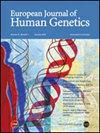The development and usability of ‘The Genetics Navigator’: a digital solution for adult and paediatric clinical genetics services
IF 4.6
2区 生物学
Q2 BIOCHEMISTRY & MOLECULAR BIOLOGY
引用次数: 0
Abstract
Clinical genetic services address diverse genetic testing needs, but there is no comprehensive digital solution to meet this variety. We aimed to develop and test the usability of the Genetics Navigator (GN), a platform designed to enhance genetic services for paediatric and adult patients. The GN prototype was created with input from a patient and clinician advisory board, informed by prior research. Usability testing involved genetics patients (N = 14), parents of paediatric patients (N = 4), and the general public (N = 10). Participants provided feedback using the ‘think aloud’ method when using the platform. We used the System Usability Scale (SUS) for quantitative evaluation. Qualitative data were coded by platform section, item, and identified key areas for improvement. Building on the Genetics Adviser platform, we added video and written content for various genetic conditions and patient groups, including pre-test education, counselling, decision support, history collection, post-test result disclosure, and management. Key feedback during rounds of usability testing emphasized the need for a supportive design, seamless workflow, and engaging experience of the tool. The tool was modified to reflect the feedback, and the GN achieved an average SUS score of 87.7 ± 10.9 (N = 28), indicating above-average usability. Future research will evaluate its clinical and cost-effectiveness in a randomized trial.

“遗传学导航员”的开发和可用性:成人和儿科临床遗传学服务的数字解决方案。
临床遗传服务解决了不同的基因检测需求,但没有全面的数字解决方案来满足这种多样性。我们的目标是开发和测试遗传导航(GN)的可用性,这是一个旨在加强儿科和成人患者遗传服务的平台。GN原型是在患者和临床医生咨询委员会的指导下创建的,并得到了先前研究的通知。可用性测试涉及遗传学患者(N = 14),儿科患者的父母(N = 4)和一般公众(N = 10)。参与者在使用平台时使用“大声思考”的方法提供反馈。我们使用系统可用性量表(SUS)进行定量评估。定性数据按平台分段、项目编码,并确定了需要改进的关键区域。在“遗传学顾问”平台的基础上,我们增加了针对各种遗传状况和患者群体的视频和书面内容,包括检测前教育、咨询、决策支持、病史收集、检测后结果披露和管理。轮次可用性测试期间的关键反馈强调了对支持性设计、无缝工作流程和引人入胜的工具体验的需求。对该工具进行修改以反映反馈,GN达到了平均SUS得分87.7±10.9 (N = 28),表明高于平均水平的可用性。未来的研究将在随机试验中评估其临床和成本效益。
本文章由计算机程序翻译,如有差异,请以英文原文为准。
求助全文
约1分钟内获得全文
求助全文
来源期刊

European Journal of Human Genetics
生物-生化与分子生物学
CiteScore
9.90
自引率
5.80%
发文量
216
审稿时长
2 months
期刊介绍:
The European Journal of Human Genetics is the official journal of the European Society of Human Genetics, publishing high-quality, original research papers, short reports and reviews in the rapidly expanding field of human genetics and genomics. It covers molecular, clinical and cytogenetics, interfacing between advanced biomedical research and the clinician, and bridging the great diversity of facilities, resources and viewpoints in the genetics community.
Key areas include:
-Monogenic and multifactorial disorders
-Development and malformation
-Hereditary cancer
-Medical Genomics
-Gene mapping and functional studies
-Genotype-phenotype correlations
-Genetic variation and genome diversity
-Statistical and computational genetics
-Bioinformatics
-Advances in diagnostics
-Therapy and prevention
-Animal models
-Genetic services
-Community genetics
 求助内容:
求助内容: 应助结果提醒方式:
应助结果提醒方式:


